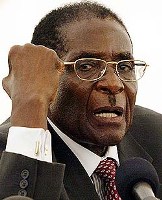African Leaders: Authors of Economic Crisis?
Economic prosperity has been a contentious and elusive issue for black people in particular in much of postcolonial Africa; the emerging nationalist leaders peddled a doctrine that poverty was an invention of the colonial establishment.
The nationalist leaders have continued to deny ownership of the economic status and economic destiny of their subjects up to this day, more than 50 years after the independence of the first African nation, Ghana. Zimbabwe’s case is no exception to the idea that we are underdeveloped because of the colonial past, a past marred by a socio-economic and political apartheid skewed in favour of the white minority.
The warped understanding of the leadership in authoring the destiny of their own people is an African disease whose symptoms are exhibited by pretending that we are just mere victims of the colonial state or victims of Britain, Australia, USA and New Zealand.
 |
| President Robert Mugabe |
Our dear leadership in the postcolonial state views themselves as mere victims than authors of their history, giving birth to an economic rights movement, which is just a euphemism for anarchism. This anarchist economic philosophy has undermined African potential of the people in much of modern day postcolonial Zimbabwe.
Let us take the colonial state as a control experiment and Zimbabwe as an experiment, and like scientists, observe the reaction after adding in a third rare investigated factor, property rights anarchism from the year 1999 up to date.
A microscopic view of Zimbabwean specimen will reflect the causal link between the annihilation of property rights and the economic decadence. The leadership never ceases to further the path of anarchism buried deep in the economic rights movement. The announcement by the Ministry of Industry and International Trade that it has appointed a board for the Zimbabwe Development Corporation (ZDC) tasked with establishing ‘peoples shops’ and administering companies seized from purported saboteurs of the economy is in its own right a failed policy. It is irrational for government to take up management functions of the economy because it has never been a good entrepreneur. State management of seized companies is just a euphemism for a criminal state.
Devious creatures such as ZDC, Constitutional amendment number 17 and other statutes are coercive redistributive mechanisms aimed at transferring wealth to cronies and kleptocrats at the expense of genuine private interests. This has left Zimbabwe an isolated island nation that undermines the rule of law and natural justice.
While the rest of the third world is opening up economies to Foreign Direct Investment (FDI) and harnessing globalisation for the prosperity of their own people, the ball is in the court of the masses to decide whether they should continue to entrust their destiny and those of generations to come to such a myopic leadership which chats a doomed economic philosophy.
